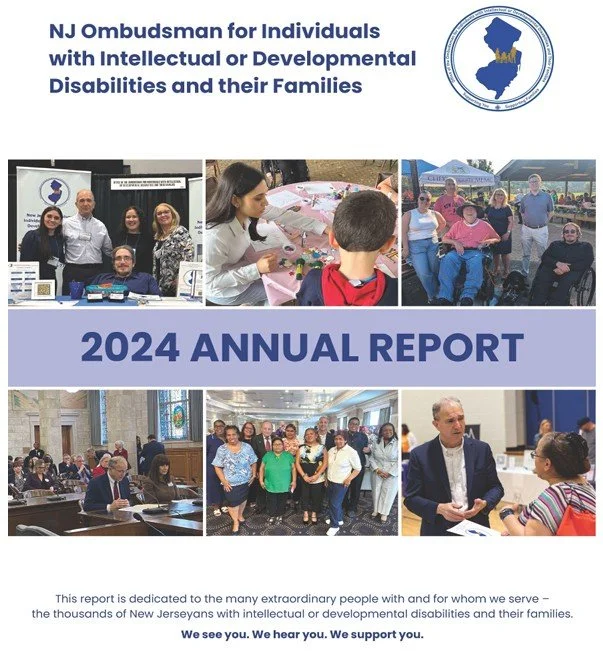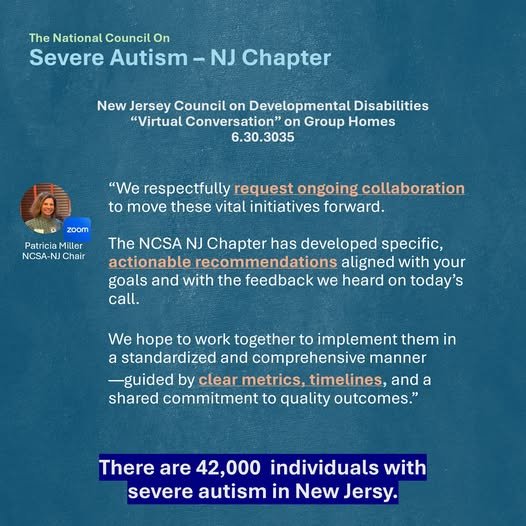By: Jackie Kancir, NCSA executive director
The obligation of the state to protect its most vulnerable residents is not merely moral but legal. When that duty fails—particularly in the context of group homes for individuals with severe autism—the consequences are profound, systemic, and life-threatening.
A newly released report from the New Jersey Ombudsman provides stark evidence of pervasive failures in the oversight of group homes in New Jersey. These findings confirm long-standing concerns raised by families, advocates, and specifically the New Jersey Chapter of the National Council on Severe Autism (NCSA).
This post examines the report’s key findings, situates them within the policy failures they expose, and highlights the advocacy leadership demonstrated by our New Jersey Chapter in pressing for reform.
Findings of the Ombudsman’s Report
The report exposes a disturbing pattern of systemic failure in New Jersey’s disability care system—one with devastating human consequences:
Critical incidents went unreported to oversight agencies, violating regulations and undermining transparency.
Allegations of abuse and neglect were concealed or poorly investigated, shielding providers from accountability.
Families were kept in the dark about serious incidents affecting their loved ones, weakening their role as guardians and advocates.
Oversight agencies were under-resourced and understaffed, leading to significant backlogs and ineffective monitoring.
Investigations often let provider agencies police themselves, producing predictable “unsubstantiated” findings.
Over 2,300 new visitors sought information on how to report abuse or neglect in a single year.
Direct Support Professionals are paid barely above minimum wage, fueling high turnover and unsafe understaffing.
Bureaucratic complexity and lack of transparency leave families struggling in crisis.
The Ombudsman describes this as a “tale of two systems”: one that works for some, and another that abandons many to abuse, neglect, undertrained staff, and opaque processes with no sense of urgency.
Importantly, this is not just New Jersey’s story. Across the country, NCSA’s National Grassroots Network finds no state immune to similar, haunting failures rooted in weak oversight, poor transparency, and lack of accountability.
Legal and Policy Context
Under New Jersey law, licensed group homes for individuals with developmental disabilities are required to report critical incidents to the state and to families or guardians. Failure to do so violates both the letter and spirit of applicable regulations.
Moreover, states receiving Medicaid funding for long-term services and supports have federal obligations to ensure health and welfare, including incident reporting, investigation, and remediation. The failures described in the report risk noncompliance with these obligations.
These systemic gaps reflect a failure in governance and enforcement. They also undermine the principles of person-centered planning and supported decision-making that are foundational to disability rights law and policy.
Alignment with NCSA’s Guiding Principles
NCSA’s Guiding Principles emphasize:
Accountability and transparency in service systems.
Person-centered supports that address the lifelong needs of individuals with severe autism.
Respect for the role of families as essential partners and advocates.
The findings of this report are in direct conflict with those principles. When states and providers withhold information about abuse or neglect, they deny families the ability to make informed decisions, obstruct efforts to improve care quality, and put vulnerable individuals at risk of irreparable harm.
Advocacy Leadership of the New Jersey Chapter
The New Jersey Chapter of NCSA has responded to these failures with exceptional leadership and strategic advocacy:
Documenting family reports of abuse, neglect, and non-reporting.
Meeting directly with legislators to demand mandatory critical-incident reporting, transparent licensing records, and meaningful penalties for noncompliance.
Partnering with investigative journalists and watchdog organizations to ensure that these issues receive sustained public scrutiny.
Building coalitions with other disability advocacy organizations to strengthen legislative and regulatory reform efforts.
We also want to specifically commend New Jersey Ombudsman for Individuals with Intellectual or Developmental Disabilities and Their Families, Paul Aronsohn, for producing this detailed, unflinching investigative report. His office’s work demonstrates a serious commitment to transparency and accountability, giving voice to families who have too often been ignored, and providing a vital foundation for real policy reform.
Their combined work demonstrates the power of local, family-driven advocacy in confronting systemic failures and demanding real accountability.
Recommendations for Action
For policymakers, advocates, and families, this report should serve as a call to action:
Study the Report. Understand the nature and scale of the oversight failures it documents.
Demand Transparency. Support legislative reforms mandating timely, accessible reporting of critical incidents to families and regulators.
Strengthen Oversight Capacity. Advocate for adequate funding and staffing of oversight agencies to ensure rigorous, independent monitoring.
Protect Family Rights. Insist on policies that respect the legal and moral authority of families to know what happens to their loved ones in state-licensed care.
Promote Accountability. Support reforms that impose meaningful consequences for providers and state agencies that fail to meet their obligations.
NCSA Remains Committed
This investigative report confirms what many families of individuals with severe autism have long known: without effective oversight, transparency, and accountability, the promise of safe, person-centered residential care is hollow.
The leadership of the New Jersey Chapter of NCSA demonstrates how focused, informed, and collaborative advocacy can shine light on systemic failures and drive meaningful policy reform.
NCSA remains committed to supporting these efforts, amplifying the voices of families, and ensuring that the right to safety and dignity is not optional but enforced.
Further Reading and Resources:


